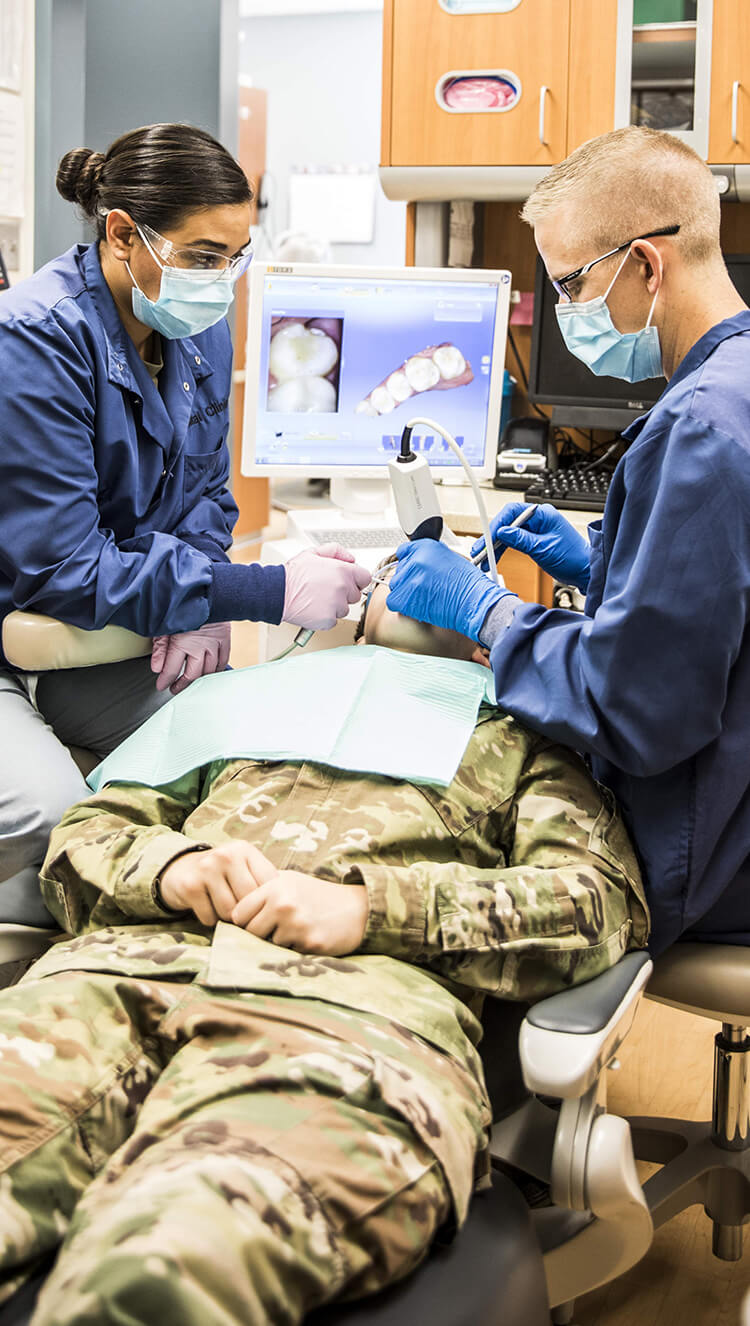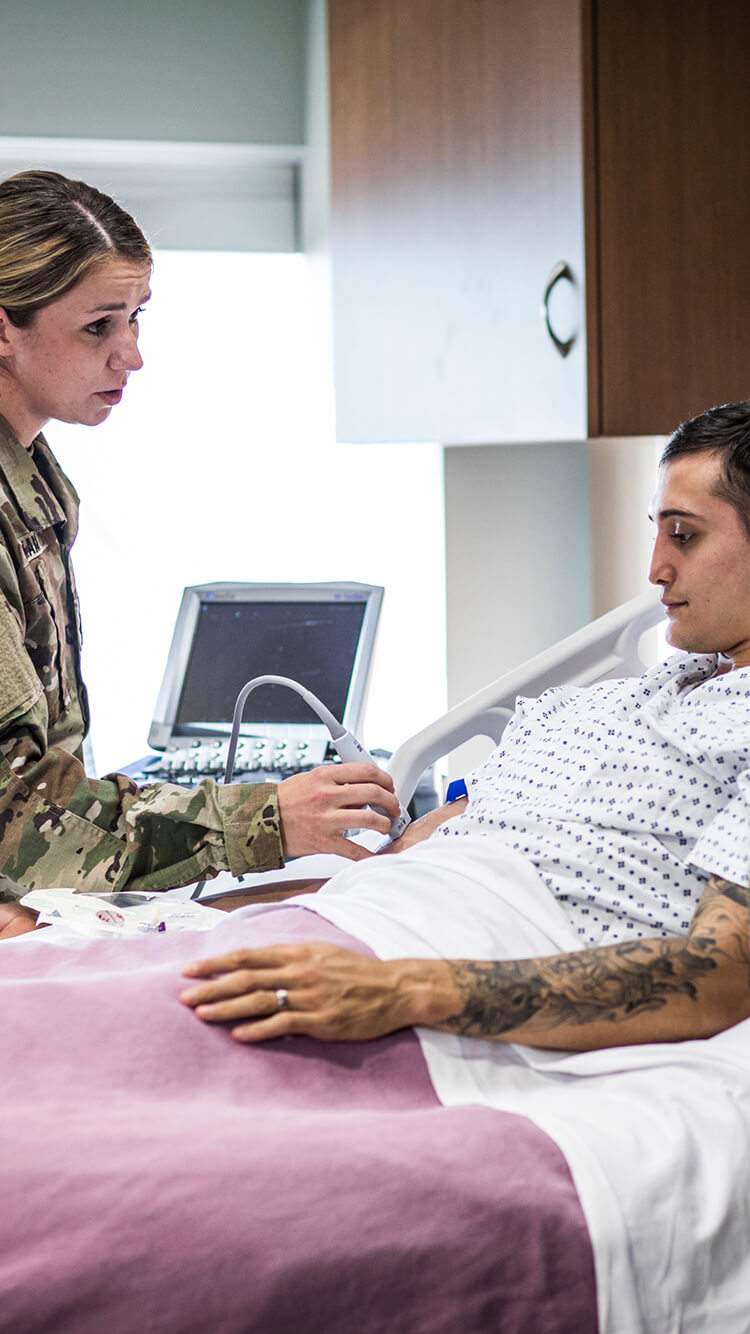
Get high-quality health care without the high price
Focus less on fees and more on your future.
Simplifying Your Health care
We know health care can be incredibly complex, so we’ve covered a few topics to help clear up any confusion.
-
Coverage Eligibility
-
Full-time Soldiers and their immediate families receive free health care coverage. Part-time Soldiers can choose from a number of plans that cover both them and their immediate families at rates highly reduced compared to the general public.
-
Full-Time vs. Part-Time Coverage
-
When you join the military, you’ll have access to TRICARE, the military’s health care program. Full-time Soldiers receive TRICARE Prime and pay no out-of-pocket costs. Part-time Soldiers can take advantage of TRICARE Reserve Select, and pay low monthly premiums.
In addition to your medical care, TRICARE also offers dental, vision, pharmacy, life insurance, mental health support, and benefits for special needs individuals.
-
Deployment Coverage
-
If you’re a part-time Soldier that is called up to active duty, you'll become eligible to change to TRICARE Prime, the plan used by full-time Soldiers that provides free coverage for you and your family.
-
Post-Service Coverage
-
Soldiers have 90 days after leaving the Army to change to another health care plan if eligible, including transitional and temporary coverage plans. Retired Army members and their families are eligible for many of the same plans as full-time and part-time Soldiers, though things like annual fees, premiums, and copayments will be different.
Compare Your Monthly Costs
- Experience: 1 YR
- Rank: Private First Class
- Experience: 1 YR
- Rank: Private First Class
Stay Covered No Matter How You Serve
Talk to your local recruiter to get the full details.
Thanks for reaching out,
Questions you may have right now
- Who will reach out to me?
One of our recruiters will either call or email you to set up time to talk.
- Who will reach out to me?
One of our ROTC recruiters will either call or email you to set up time to talk.
- What will you ask me?
Our conversation will likely begin with some basic qualifying questions, like your age and education level. From there, the conversation will be about getting to know you and your goals for the future. Expect us to ask about your interests and skills so we can suggest Army jobs that might interest you.
- How can I prepare for the conversation?
-
While we'll ask you questions, this is your opportunity to ask some of your own. Here are a couple to get you started:
How can the Army help me pay for college?
Do I have to go to Basic Training?
- How can I prepare for the conversation?
-
While we'll ask you questions, this is your opportunity to ask some of your own. Here are a couple to get you started:
How can the Army help me pay for college?
What is the time commitment for part-time service?
- How can I prepare for the conversation?
-
While we'll ask you questions, this is your opportunity to ask some of your own. Here are a couple to get you started:
Can the Army help me pay for medical school?
Do I have to go to Basic Training?
- How can I prepare for the conversation?
-
While we'll ask you questions, this is your opportunity to ask some of your own. Here are a couple to get you started:
How do I apply for ROTC scholarships?
How do I join ROTC at the college I want to attend?
- Will I be expected to join if I talk to someone?
No. Our goal is to answer your questions and help you decide if the Army is a good option for you. We understand you may not be ready to join yet, or that we may not be the right fit, and that's fine. There's no obligation for talking to us.
KEEP EXPLORING
Explore more topics that may interest you
Thanks for reaching out,
Questions you may have right now
- Who will reach out to me?
One of our recruiters will either call or email you to set up time to talk.
- What will you ask me?
Our conversation will likely begin with some basic qualifying questions, like your age and education level. From there, the conversation will be about getting to know you and your goals for the future. Expect us to ask about your interests and skills so we can suggest Army jobs that might interest you.
- How can I prepare for the conversation?
-
While we'll ask you questions, this is your opportunity to ask some of your own. Here are a couple to get you started:
Do I qualify to join the Army?
Can I join as an Officer?
- How can I prepare for the conversation?
-
While we'll ask you questions, this is your opportunity to ask some of your own. Here are a couple to get you started:
Do I qualify to join the Army?
Can I join as an Officer?
- How can I prepare for the conversation?
-
While we'll ask you questions, this is your opportunity to ask some of your own. Here are a couple to get you started:
What type of health care jobs are available in the Army?
Can the Army help me pay for medical school?
- How can I prepare for the conversation?
-
While we'll ask you questions, this is your opportunity to ask some of your own. Here are a couple to get you started:
Can I join ROTC at my age
Can I join as an Officer?
- Will I be expected to join if I talk to someone?
No. Our goal is to answer your questions and help you decide if the Army is a good option for you. We understand you may not be ready to join yet, or that we may not be the right fit, and that's fine. There's no obligation for talking to us.
KEEP EXPLORING
Explore more topics that may interest you
Thanks for reaching out, .
We admire you for considering such a big career decision at your age. Unfortunately, we're unable to directly reach out to you until you are at least sixteen years old and a junior in high school. However, the following ROTC info is something that may interest you now.
Questions you may have right now
- How old do I have to be to serve in the Army full-time?
To become an enlisted Soldier, you must be 17 years old. To become an Army Officer, you must be at least 18 years old and have a college degree obtained either through ROTC, U.S. Military Academy at West Point, or from another college or university program. Learn more about Army Eligibility Requirements and how to receive Officer training while in college.
- How can the Army help me pay for college?
There are a variety of options available to help you pursue education with flexibility, such as ROTC programs, the GI Bill, and other programs that help pay for college tuition, trade school, technical school, or trainings. View all of the Education Benefits available to you
- How do I apply for ROTC Scholarships?
Army ROTC has several scholarships available for college-bound high school students. Review your options at ROTC Scholarships, or immediately apply by creating an account at my.goarmy.com to get started.
- How old do I have to be to serve in the Army part-time?
To become an enlisted Soldier, you must be 17 years old. To become an Army Officer, you must be at least 18 years old and have a college degree obtained either through ROTC, U.S. Military Academy at West Point, or from another college or university program. Learn more about Army Eligibility Requirements and how to receive Officer training while in college.
- What are the ways to serve part-time?
You can serve part-time as a Soldier in the Army Reserve or the Army National Guard. By serving part-time, you are able to continue your college education or work a civilian job, while earning an extra paycheck and maintaining many of the benefits of military service.
- How can the Army help me pay for college?
There are a variety of options available to help you pursue education with flexibility, such as ROTC programs, the GI Bill, and other programs that help pay for college tuition, trade school, technical school, or trainings. View all of the Education Benefits available to you.
- How do I become a health care provider in the Army?
You can serve part-time or full-time as you train in our health care program. Upon graduation of the program, you will enter the Army health care team as a Commissioned Officer.
- What types of medical careers are available in the Army?
There are numerous health care careers available through the Army Medical Education Deparment (AMEDD), including physicians, dentists, nurses, veterinarians, and many more. View your career options.
- How can the Army help me pay for college?
There are a variety of options available to help you pursue education with flexibility, such as ROTC programs, the GI Bill, and other programs that help pay for college tuition, trade school, technical school, or trainings. View all of the Education Benefits available to you.
- What are the benefits of joining ROTC?
ROTC makes it possible to achieve your ambitions. Become a leader and serve your country in one of the nation's top leadership training programs. You can do this while maintaining your college curriculum and earning up to 100% tuition coverage. Upon graduation, you're guaranteed a career as an Army Officer.
- How do I prepare to join ROTC?
When you're at least 16 years old and at least a high school junior, you can reach out to us, or even talk to your high school counselor. Together, we'll talk options and decide if ROTC is the right path for you.
- Will I become an Officer if I complete ROTC?
Yes. After graduation, you are commissioned as a highly respected second lieutenant in the Army, entrusted with leading other Soldiers.
KEEP EXPLORING
Explore more topics that may interest you
Curious what career is best for you?
Discover opportunities you never knew existed with Army Career Match.
In the Army Reserve, the medical benefits are incredible and because of that I feel like I have more time to concentrate on my business.- Spc. Gagan Dhiman, U.S. Army Reserve

Other Benefits You Can Expect From a Career in the Army
-
See Details
Education
Go to school debt free
-
See Details
Skills & Training
Become a more desirable employee
-
See Details
Money & Pay
Keep your full paycheck
-
See Details
Enlistment Bonuses
Make more money quickly
-
See Details
Total Benefits
Get the complete package
